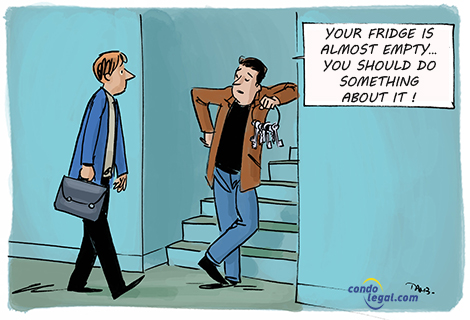
The directors of a co-ownershipmay, eventually, be required to enter a co-owner’s private portion. Article 1066 of the Civil Code of Québec obliges the co-owner, as well as their tenant or any other occupant, to accept work within their private portion. This applies particularly to urgent or conservation work aimed at ensuring the longevity of the building. It also includes necessary preliminary inspections for the preservation of the building and the safety of the occupants. Therefore, every co-owner must cooperate in such situations. Cooperation is essential to maintain the integrity and safety of the property.
General legal principles
Before getting to the crux of the matter, the syndicate and the co-owners must understand their respective rights and duties. Article 1042 of the Civil Code of Québec defines the privative portion concept, stating that they are owned by a specific co-owner - which precludes the notion of the collective ownership of undivided portions - and are for his exclusive use. As for the limited access to the home of a co-owner, the Charter of Human Rights and Freedoms specifies (without limitation):
Article 6: Every person has a right to the peaceful enjoyment and free disposition of his property, except to the extent provided by law;
Article 7: A person’s home is inviolable;
Article 8: No one may enter upon the property of another or take anything therefrom without his express or implied consent.
The Charter of Rights and Freedoms is based on the principle that "every human being possesses intrinsic rights and freedoms designed to ensure his protection and development", that "all human beings are equal in worth and dignity, and are entitled to equal protection of the law", and that "the rights and freedoms of the human person are inseparable from the rights and freedoms of others and from common well being."
Inviolability of the home
As to the inviolability of a home stipulated in Article 7 (cited above), it is not absolute. You should keep in mind that the Civil Code of Québec governs, in harmony with the Charter of Human Rights and Freedoms and the general principles of law, the persons, the relationships between persons, as well as property. In divided co-ownership, sharing collective real estate property (common portions) must strike a balance between the individual and collective interest. Therefore, inviolability has limits, provided that the co-owner concerned is not harmed in a lasting manner in the enjoyment of his property, to avoid management problems within a co-ownership.
Access by appointment
The declaration of co-ownership generally provides that the syndicate's directors, the manager, the syndicate’s agents, employees, and contractors have free access to the private portions by appointment at any reasonable hour for purposes permitted by the declaration of co-ownership,
Crucial access
This being established, however, this right of access enjoyed by the syndicate does not allow the directors to have abusive access to the unit without the consent of the co-owner. To gain access to a co-owner’s the unit of, the onus is on the syndicate. It will need to demonstrate that access is crucial to carry out work necessary for the preservation of the immovable. This access is predicated upon no other reasonable alternative being available, or that entry into an apartment represents the optimal solution.
Regardless of the nature of the work, the syndicate must always avoid, insofar as feasible, entering an apartment merely to facilitate workplace access. For example, if a balcony needs repairs, it should be done from the outside (if possible) - even if it needs to be accessed with a nacelle - rather than through an apartment. The syndicate should not invade an apartment, on the mere grounds that it is more convenient or less expensive.
 WHAT YOU SHOULD KNOW ! The declaration of co-ownership often includes a servitude of access against private portions in favor of common areas and other private portions to allow access for the syndicate and other co-owners when justified, for example, during the execution of work and inspections.
WHAT YOU SHOULD KNOW ! The declaration of co-ownership often includes a servitude of access against private portions in favor of common areas and other private portions to allow access for the syndicate and other co-owners when justified, for example, during the execution of work and inspections.
 WHAT TO KEEP IN MIND : The courts have recognized the validity of a clause in the declaration of co-ownership authorizing the syndicate to have keys to the private portion and to access it, despite the fact that article 7 of the Charter of Human Rights and Freedoms guarantees the right to the inviolability of the home.
WHAT TO KEEP IN MIND : The courts have recognized the validity of a clause in the declaration of co-ownership authorizing the syndicate to have keys to the private portion and to access it, despite the fact that article 7 of the Charter of Human Rights and Freedoms guarantees the right to the inviolability of the home.
 WARNING ! The of the co-owner’s liability could be invoked if he does not collaborate with the syndicate. If he refuses to allow workers to enter his private portion (if no other alternative is possible), to carry out important work to preserve the immovable, he may be condemned to pay the additional costs resulting therefrom.
WARNING ! The of the co-owner’s liability could be invoked if he does not collaborate with the syndicate. If he refuses to allow workers to enter his private portion (if no other alternative is possible), to carry out important work to preserve the immovable, he may be condemned to pay the additional costs resulting therefrom.
Back to the mega-factsheet: The work of the syndicate in a privative portion

